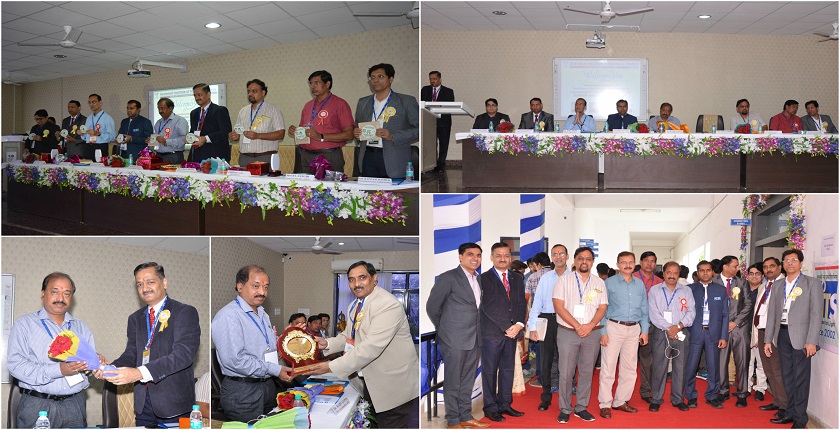
Geetanjali Institute of Technical Studies, Dabok successfully organised an International Conference on “Eco-Smart Sustainable Development in Engineering Technology and Management” which was contributed by eminent officials from prestigious organizations, consultants, experts and engineers from various areas of urban planning and development who expressed their valuable insights on Sustainable Development in the field of Engineering and Management.
The conference commenced with the ritual of lamp lightning by the Chief Guest, Prof. Dr. Rajeev Gupta, Pro Vice-Chancellor Rajasthan Technical University (Kota), the Keynote Speakers Prof. Dr. Rahul Jain (Associate Professor in Computer Science Department of National University of Singapore (NUS)), Prof. Dr. Anurag Shrivastava (Prof. Washington State University, USA), Prof. Dr. Akshay Rathore (Assistant Professor in department Electrical and Computer Engineering, National University of Singapore (NUS)), and Prof. Dr. Vinod Khadkikar (Prof. MIST, Abu Dhabi, UAE) , Dr. Vikas Misra Director -GITS, Dr. P K Jain Director –MBA, Finance Controller B.L. Jangir and the conference convenors, Dr. Manish Varma and Prof. Rajeev Mathur, to invoke the blessings of Goddess Saraswati.
In the beginning of the conference Prof. Dr. Vikas Misra, Director, GITS welcomed all the guests and stated that the prime objective of the International Conference is to synthesize an emerging understanding of the Eco Smart Development, determine major research themes, and fill gaps in the current Smart cities programs. The conference was a platform for assimilation of knowledge and experiences of experts involved in Sustainable development.
Prof. Rajeev Mathur – Conference Secretary brief about the agenda of this conference. He also stated that 279 Research Papers is received from various research scholars, industry experts and students. Acceptance ratio is 33%.
Dr. P K Jain, Director MBA stated that Environmental sustainability is responsible interaction with the environment to avoid depletion or degradation of natural resources and allow for long-term environmental quality. The practice of environmental sustainability helps to ensure that the needs of today’s population are met without jeopardizing the ability of future generations to meet their needs.
The Chief Guest of the conference Prof. Dr. Rajeev Gupta, Pro Vice-Chancellor Rajasthan Technical University (Kota) said that Buildings contribute to sustainable development when designed and operated to match the appropriate fitness for use, with minimum adverse environmental impacts, while encouraging improvements in economic, social and cultural aspects at local, regional and global levels.
The first keynote speaker Prof. Rahul Jain, (Associate Professor in Computer Science Department of National University of Singapore (NUS)) said that development needs to be sustainable and inclusive of economic, financial and environmental development. Sustainable mobility takes into account a broader approach than sustainable transport as it is a concept of integrating realization of the needs of stakeholders by using remote access to the properties of desired goods and services. It realizes the need to minimize the negative impact on the environment.
The Second keynote speaker Prof. Dr. Akshay Rathore (Assistant Professor in department Electrical and Computer Engineering, National University of Singapore (NUS)) said that Vehicle-to-Grid (V2G) technology is a system in which plug-in electric vehicles, such as electric cars (BEV), plug-in hybrids (PHEV) or hydrogen Fuel Cell Electric Vehicles (FCEV), communicate with the power grid to sell demand response services by either returning electricity to the grid or by throttling their charging rate. Vehicle-to-grid can be used with grid able vehicles, that is, plug-in electric vehicles (BEV and PHEV), with grid capacity.
The third keynote speaker Prof. Dr. Anurag Shrivastava (Prof. Washington State University, USA) conveyed that a Nano grid is different from a micro grid. A nano grid, however, would be “indifferent to whether a utility grid is present.” Rather, it would be a mostly autonomous DC-based system that would digitally connect individual devices to one other, as well as to power generation and storage within the building.
The technical sessions on the first day chaired by the most esteemed and amiable Prof. Rahul Jain, Prof. Anurag Srivastava, Prof. Dr. Akshay Rathore and Prof. Dr. Vinod Khadkikar.
Vote of Thanks Given by Dr. Manish Varma, Conference Secretary.




